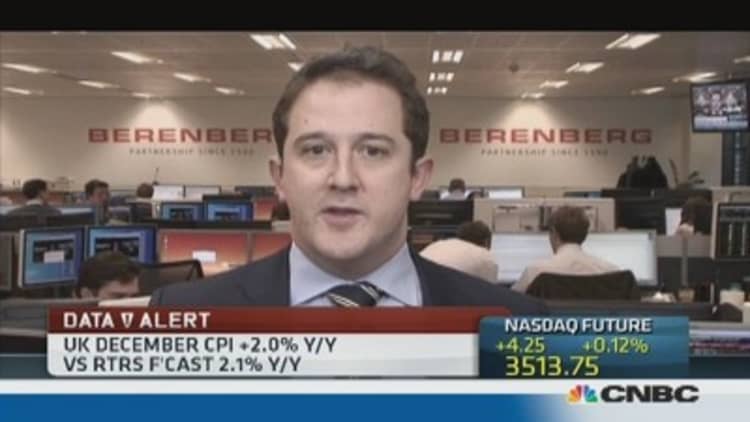
Inflation in Britain fell more than expected in December, hitting the Bank of England's 2 percent target for the first time since November 2009.
The Consumer Prices Index (CPI) rose by 2 percent in the year to December, according to the U.K.'s Office of National Statistics (ONS) on Tuesday, following a 2.1 percent increase in November. The headline rate of inflation came in below the expectations of economists polled by Reuters, who forecast it to hold steady in December.
(Read more: One in 10 young Brits 'have nothing to live for')
The largest contribution to the fall in inflation came from prices for food - especially fruit and meat - which rose at a slower rate than a year ago, the ONS said. Non-alcoholic drinks and the cost of recreational products like computer games also contributed, the ONS said, although these were partially offset by a rise in the cost of petrol and diesel.
Robert Wood, chief U.K. economist at Berenberg Bank, said the inflation data could ease pressure on the Bank of England to increase interest rates.
"We're bang on the target, which is an awful lot better than the U.K. was a year or two ago," he told CNBC. "The Bank of England has a bit of room still to wait before it hikes rates, because inflation should fall a bit further over the coming months."
(Read more: UK unemployment falls, putting rate hike in focus)
Last week, Britain's central bank held off from introducing further stimulus at its monthly monetary policy meeting, amid guidance from BoE Governor Mark Carney that interest rates would not be raised until U.K. unemployment hits 7 percent.
But unemployment is falling faster than most expected, as the U.K. economic recovery gathers pace. Over the three months to October, the headline rate of unemployment fell to 7.4 percent – its lowest level in four and a half years – and employment rose by 250,000 to a new record high of 30.086 million.
Howard Archer, chief U.K. economist at IHS Global Insight, said the inflation data would be welcomed by the Bank of England, and should also provide some relief for consumers, which have been battling rising prices amid stagnant wage growth.
"This eases the squeeze on consumers' purchasing power, which is helpful to growth prospects, as well as facilitating the Bank of England keeping interest rates down at 2 percent," he said.
But he stressed that the squeeze on consumers' purchasing power "remained significant," given that annual earnings growth was just 0.9 percent in the three months to October.
House price rises
Meanwhile, separate data published by the ONS on Tuesday revealed that house prices rose by 0.5 percent between October and November, following a 1.4 percent jump the previous month. Year-on-year, house prices were 5.4 percent higher - slightly below the 5.5 percent increase recorded in October.
(Read more: UK graduate recruitment seen at highest since 2007)
In London, where worries of bubble conditions have been brewing, annual house price inflation came in at 11.6 percent.
Archer added that the data was likely maintain concerns that a housing bubble could develop in 2014.
"There is a very real danger that house prices could really take off over the coming months, especially if already significantly improving housing market activity and rising buyer interest is lifted appreciably further by the 'Help to Buy' mortgage guarantee scheme which was launched (by the government) in October," he said.
Follow us on Twitter: @CNBCWorld


